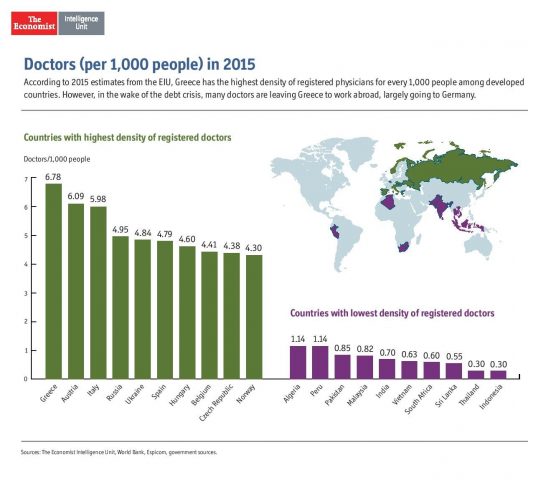The Data Explosion is real — we are not only producing more data than ever before, we are also producing it at a faster rate. The graph below is for overall data but representative for health also.

This explosion has far-reaching implications for us as patients; when it comes to health startups it allows for time and tested business models to really succeed. This post provides a framework — like any framework it is not exhaustive but an overall guideline on how to structure the world.
1) Licensing — Think Pharma
Popular companies like 23AndMe and Ancestry provide you with genetic or genealogical information in exchange for your informed consent to share the data with pharma. Both sites have been selling the data to third parties like P&G Beauty and Pepto-Bismol, and universities like The University of Chicago for some time. And some of it is extremely lucrative — GlaxoSmithKline announced a $300M deal with 23andMe in 2018, one of a handful that explain the company’s last public valuation of $2.5B. Following these footsteps several startups are working to license data for the proteome (the proteins the genetic data encodes), the metabolome (how those proteins result in your body processing energy), the microbiome (think gut bacteria), in fact every ome you can imagine. Why pharma likes licensing? Because drug discovery is famously time-consuming (10 years on average) and expensive ($1B on average) and massive amounts of data are keys to shorten the cycle and avoid expensive mistakes.

2) Analytics / Diagnostics — Think Providers
Providing the tools and insights from data is the core of so many startups in areas as disparate as medical imaging to arrhythmia detection and diabetes diagnostics. Zebra Medical interprets patients scans claiming they can get higher accuracy at a lower price, or at the very least help overworked doctors be faster and avoid errors. Zebra specifically took three years to assemble enough data and receives its first FDA clearance in 2018 for an algorithm that detects coronary blockage.Since then they have been approved also for detecting brain bleeds and assessing chest X-rays. Why providers like analytics / diagnostics? Because healthcare is stretched globally, and especially in emerging countries we simply don’t have enough doctors.

3) Lead Gen — Think Payors
Beyond selling the data directly or providing tooling for it, the third way health startups can make money is analyzing the data to identify leads and sell those. HealthIQ has a quiz app that allows you to test your health knowledge and based on your performance, the company projects your health behaviors. Given that habits lead to outcomes the company can then identify people who are at a lower risk and offer them life insurance with discounts. It’s effectively a big data actuarial model that coupled with medical tests leads to less false positives and negatives when predicting people’s life expectancy and life quality. Why payors like lead gen? By many estimates half of the costs in insurances are administrative so reducing them and ideally increasing revenue is especially attractive.
 The overall key challenges around data remain:
The overall key challenges around data remain:
- Privacy — how we collect, store, and utilize personal information
- Security — how we ensure the data doesn’t fall into wrong hands
- Comprehensiveness — how we ensure the data is actually representative of the world
Which makes sensible regulation, a hallmark of healthcare, even more critical as we move into this brave new world of data and algorithms.
Originally published on: “Data Driven Investor.” I am the Managing Partner and Cofounder of Tau Ventures with 20 years in Silicon Valley across corporates, own startup, and VC funds. These are purposely short articles focused on practical insights (I call it gl;dr — good length; did read). Many of my writings are at https://www.linkedin.com/in/amgarg/detail/recent-activity/posts and I would be stoked if they get people interested enough in a topic to explore in further depth. If this article had useful insights for you comment away and/or give a like on the article and on the Tau Ventures’ LinkedIn page, with due thanks for supporting our work. All opinions expressed here are my own. Full disclosure: I was the cofounder of HealthIQ in a previous life.

